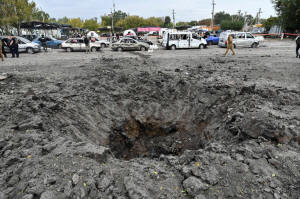Russian garrison half-encircled in Ukraine as Putin poised to proclaim
annexation
 Send a link to a friend
Send a link to a friend
 [September 30, 2022]
By Jonathan Landay [September 30, 2022]
By Jonathan Landay
ZAPORIZHZHIA, Ukraine (Reuters) - Russian
forces in Ukraine were on the verge of one of their worst defeats of the
war on Friday even as President Vladimir Putin was due to proclaim the
annexation of territory seized in his invasion.
The pro-Russian leader of occupied areas in Ukraine's Donetsk province
acknowledged his forces had lost full control of Dobryshev and Yampil
villages, leaving Moscow's main garrison in northern Donetsk
half-encircled in the city of Lyman.
The Ukrainian army was "trying at all costs to spoil our historic
events", Denis Pushilin said, referring to an annexation ceremony he was
due to attend with Putin at the Kremlin.
"This is very unpleasant news, but we must look soberly at the situation
and draw conclusions from our mistakes."
Elsehere, missiles tore through a convoy of civilian cars preparing to
cross from Ukrainian-held territory into the Russian-occupied zone,
killing at least 23 civilians. Ukrainian officials called it a
deliberate Russian attempt to sever the last links across the front.
Moscow blamed Kyiv.

Putin was scheduled to preside over the Kremlin ceremony followed by a
Red Square pop concert to celebrate Europe's biggest territorial
annexation since Hitler.
But the event looked likely to be overshadowed by the fall of Lyman,
which would signal the collapse of Russian forces in northern Donetsk
and open the way for Kyiv to assault deep into Russian-held territory
just as Putin proclaimed it annexed.
Kyiv was silent about the situation at Lyman, but pro-Russian military
bloggers reported Ukrainian forces had all but surrounded thousands of
Russian troops, cutting off their escape. Pushilin said one road to
Lyman was still open, but acknowledged it was now under Ukrainian
artillery fire.
DEAD
Friday's missile attack in Zaporizhzhia was gruesome even by the
standards of a conflict in which Russia has razed entire cities to the
ground. It came amid several other attacks on Friday hitting civilian
targets in Ukrainian-held territory along the breadth of the frontline
on the morning of Russia's planned annexation celebration.
The convoy of cars was assembling at a car park to try to cross into
Russian-held territory near Zaporizhzhia, the Ukrainian-held capital of
a region Moscow claims to be annexing. One checkpoint in the area has
been open in recent days allowing civilians to cross the front.
A crater had been gouged in the ground near two lines of vehicles. The
impact had thrown chunks of dirt into the air and sprayed shrapnel
across cars packed with belongings, blankets and suitcase. Reuters saw
around a dozen bodies.

Plastic sheets were draped over the bodies of a woman and young man in a
green car. A dead cat lay next to the young man in the rear seat. Two
bodies lay in a white mini-van in front of another car, its windows
blown out and the sides pitted with shrapnel. The corpse of an elderly
woman lay nearby, next to her shopping bag.
"So far, 23 dead and 28 wounded. All civilians," Zaporizhzhia regional
governor Oleksandr Starukh wrote on Telegram. "The occupiers struck
defenceless Ukrainians. This is another terrorist attack by a terrorist
country."
[to top of second column]
|

A crater left by a Russian missile
strike, that hit a convoy of civilian vehicles amid Russia's attack
on Ukraine, is seen in Zaporizhzhia, Ukraine September 30, 2022.
REUTERS/Stringer

A woman who gave her name as Nataliya said she and her husband had
visited their children in Zaporizhzhia and were preparing to cross
back into Russian-held territory.
"We were returning to my mother who is 90 years old. We have been
spared. Itís a miracle," she said, standing with her husband beside
their car.
Police Colonel Sergey Ujryumov, head of the explosive disposal unit
of the Zaporizhzhia police department, said the market was hit by
three S300 missiles.
Pro-Russian officials said, without evidence, that Ukraine was to
blame for the attack. Russia has always denied its forces target
civilians, despite countless confirmed incidents documented by the
United Nations and other bodies.
ESCALATION
Russia's annexation of the Russian-occupied areas of Donetsk,
Luhansk, Kherson and Zaporizhzhia, held after what the West
denounces as phoney referendums staged at gunpoint, has been
condemned in the West and beyond.
U.N. chief Antonio Guterres called it a "dangerous escalation" and a
violation of the United Nations charter.
"It can still be stopped. But to stop it we have to stop that person
in Russia who wants war more than life. Your lives, citizens of
Russia," Ukrainian President Volodymyr Zelenskiy said in a Thursday
evening address.
Since his troops were forced to flee from Ukraine's Kharkiv province
this month, Putin has chosen to escalate the war. Last week he
endorsed the annexation of Russian-held territory, ordered the
call-up of hundreds of thousands of reservists, and threatened to
use nuclear weapons if Russia is attacked.
On Friday the Kremlin repeated its assertion that any attacks on
territory it is now annexing would be attacks on Russia itself.
Ukraine has said it will take back all its territory.

Zelenskiy promised a strong response to the annexations and summoned
his defence and security chiefs for an emergency meeting on Friday,
an official said.
On the eve of the annexation ceremony Putin said that "all mistakes"
made in his military call-up should be corrected, his first public
acknowledgment of problems in the mass round-up of hundreds of
thousands of Russian men since last week.
Tens of thousands of men have fled Russia to escape the call-up.
Western countries say Moscow is rushing unprepared troops to the
frontlines with little or no training and inadequate equipment.
Britain's Ministry of Defence said troops were being told to buy
their own first aid kits.
Putin's call-up order gave no details of who must be drafted.
Russian officials have said older men or those with no military
experience should by exempt, but call-up notices have been given to
men in their fifties and to students. Members of ethnic minorities
say they have been particularly targetted, leading to unrest in
southern Russia and Siberia.
(Reporting by Reuters bureaux; Writing by Peter Graff; Editing by
Robert Birsel and Angus MacSwan)
[© 2022 Thomson Reuters. All rights
reserved.]
This material may not be published,
broadcast, rewritten or redistributed.
Thompson Reuters is solely responsible for this content. |